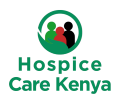In March, HCK supported a team of palliative care specialists to travel to Dadaab refugee camp in the north of Kenya, in the first steps towards developing palliative care services in the camp. Around 300,000 people live in Dadaab and Hagadera refugee camps near the Kenyan border with Somalia, with thousands facing chronic or life-threatening illness. There are no options within the camp for cancer treatment. Any person diagnosed with cancer must gain special permission to travel within Kenya, then make the journey to Garissa to receive treatment. Very few manage to access treatment in this way, the vast majority go without any curative treatment at all. This creates an urgent need for palliative care within the camps, but lack of resources and very limited provision means that patients are forced to live and die in severe distress.




The trip was the result of complex coordination involving United Nations High Commissioner for Refugees and NGOs working in the camp. The stringent controls over access to the camps, as well as challenging geography, created huge challenges for our team when planning and entering the camps to deliver the project.
The team provided palliative care training to a group of 7 health care professionals working in the camp and 13 nursing support volunteers, in a first step to improving access to care for the many people in need. The trainees will now work at facility and community levels to provide palliative care services, referrals and home-based care.
“ I came in with a mind-set that palliative care is for the dying, now I know it’s about improvement of quality of life. I may be limited due to less or unavailable resources here in the camp, but my attitude should communicate care, compassion and support. Truly, palliative care is about living”.
A nurse trainee from the camp
Please donate today to support this vital work in bringing compassion, comfort and care to refugees in northern Kenya.
